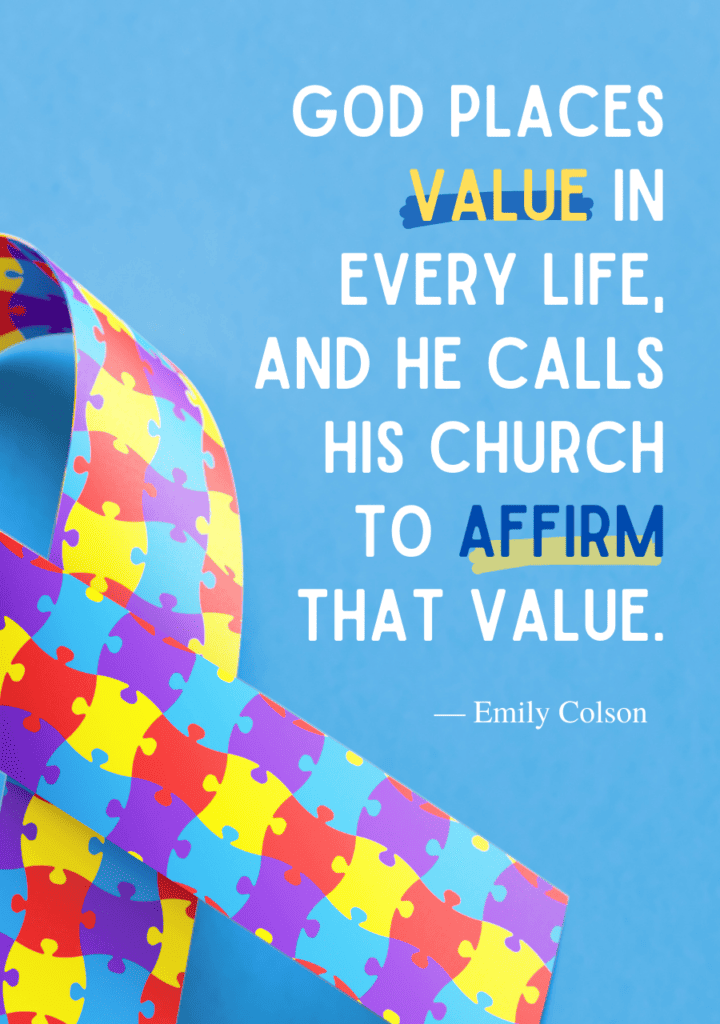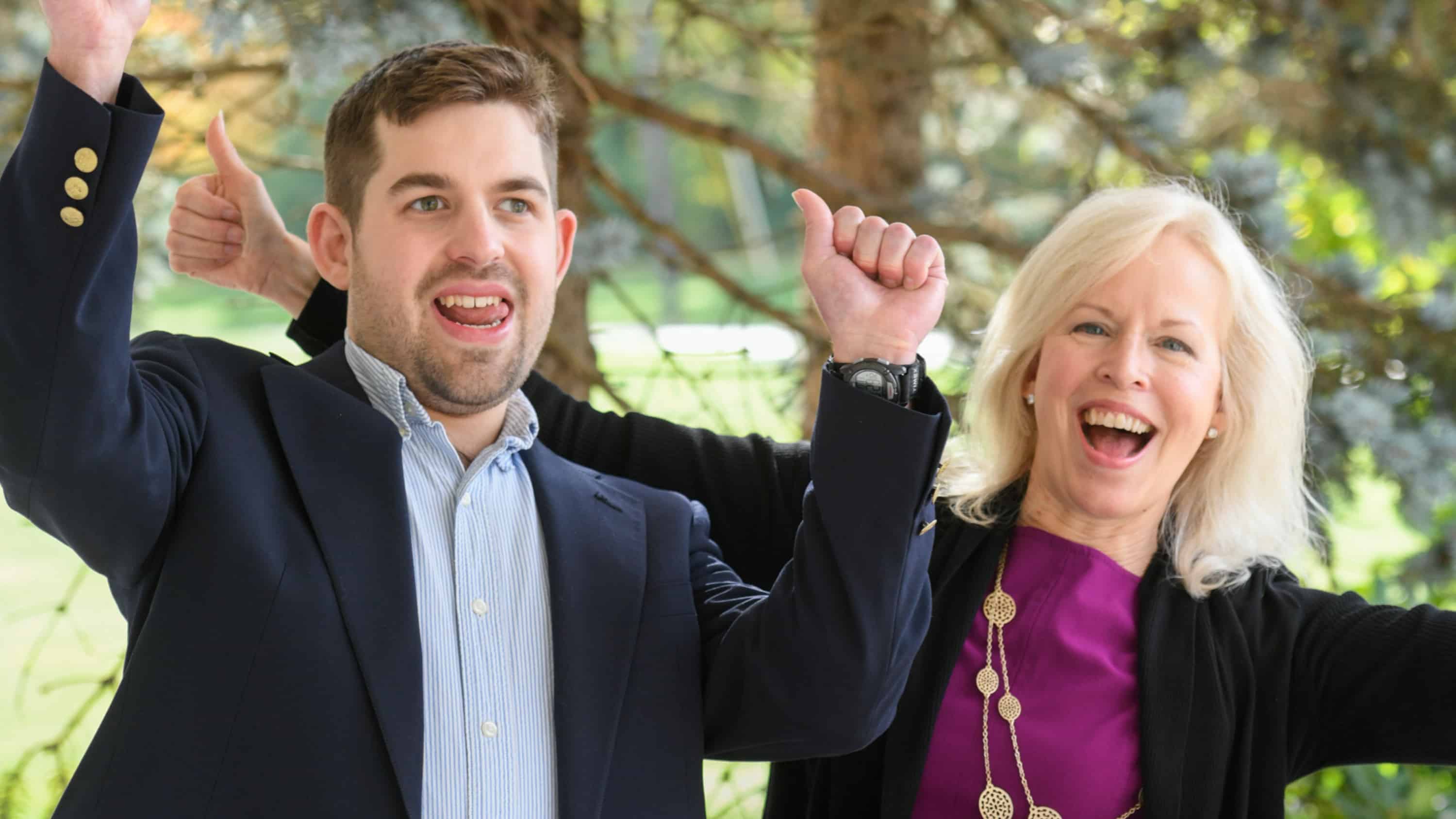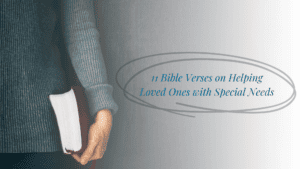Who said that autistic people are not people?
I have a son named Max. He’s 29 years old … he’s awesome … and he has a diagnosis of autism.
Nothing has been simple or easy in our lives, but God has made it beautiful.
I’ve been a single mom to Max for most of those 29 years, which means I drink a lot of coffee! It also means God has given me a beautiful perspective on life — on the value of every life.
Autistic people and the Church
One of my favorite things about Max is that he loves church. He fell in love with this one particular church service that airs on television. We’ve actually visited this church several times. It’s in Massachusetts, about 150 miles from our home. And every time we’re there, we’ve been blessed. On our last visit, we invited my friend Christine and her son, Christopher. Christopher is a little younger than Max, he also has autism, and he is blind.
We arrived at the church about 20 minutes before the service began. I told Christine, “We just have to go in. Max needs to get used to the environment. Plus, he’s too excited to stay outside!”
Sure enough, Max was bouncing up and down in the pew. He was so excited that, every now and then, he threw his hands up in the air and yelled, “We’re gonna sing God’s praises!” (Shouldn’t we all come into church like that?)
Well, there was a woman at the church wearing a bright blue shirt. I saw her get up and walk toward us. She leaned over to my friend Christine, nodded toward Max and said, “He doesn’t belong. I can’t think … can’t pray … Why can’t you just leave? He doesn’t belong.”
More Pro-Life Learning Resources:
Don’t listen to the crowd
What happened in that church has nothing to do with any denomination. It doesn’t even have anything to do with this woman. It has everything to do with our common human condition.
There’s a story I love in Matthew 20. Jesus is leaving the city of Jericho, and He’s on His way to Jerusalem. There’s a crowd around Him. And He hears two blind beggars cry out to Him from the side of the road. And do you know what happens? Do you know what the crowd around Jesus does? The Bible says, “The crowd rebuked them, telling them to be silent” (Matthew 20:31).
The crowd’s message to those two men? You don’t have any value. Jesus doesn’t have time for you two disabled men on the side of the road. You don’t belong. And when the crowd tried to silence them, the two blind men cried out even louder to Jesus, knowing He was their only hope.
And then — this is the moment I love — Jesus stopped. With the crowd around Him and the Cross before Him, Jesus didn’t listen to the voices of the crowd. He listened to the two blind men crying out for Him. Jesus turned to those men and said, “What do you want me to do for you?”
They asked for their sight. Now, we know Jesus could have healed those men from a distance and gone on His mission, but He didn’t. He got close. Very close. He put His hands on their place of brokenness and brought them healing.
Jesus didn’t listen to the crowd. He stepped in.
Responding to “Autistic People Are Not People”
The voice of the crowd is loud today, isn’t it? Telling us which lives have value and which lives do not. Pushing people aside — the disabled, the elderly, the prisoner, the unborn, the unwanted, the disruptive, the inconvenient. We see it with assisted suicide. And we see it with abortion. We especially see it with selective abortion. The number of babies we abort who are diagnosed with Down syndrome is upward of 67 percent. We know it’s higher; we just don’t have the numbers to track it accurately.
What we saw last January in the state of New York should chill us to our core. A mother can now abort her baby at any point during her pregnancy. And when that legislation passed, well-dressed, well-spoken men and women rose to their feet and cheered.
It takes little imagination for me to know who is next. When Max was diagnosed with autism, it affected around one in 10,000, maybe four in 10,000. We just knew it was rare. Now the Centers for Disease Control and Prevention report that autism affects one in every 59 children, and a new federal study reports that it’s more like one in 40 children.
Autistic people are people too
God calls us, His church, to defend life. But I want to ask a hard question: Will the church be able to defend life if the church is not yet able to sit beside that very same life for an hour in the pew on Sunday morning?
I want to take you back to that little church in Massachusetts, where this woman in a bright blue shirt leaned over to my friend, saying of Max, “He doesn’t belong.”
I’m so thankful for the friend beside me that day. Even though this wasn’t our church, or even our denomination, we had an advocate — someone who saw Max’s value. My friend Christine looked up at this woman and said, “All are welcome.”
We stayed for that service, and I’m not sure they’ve ever seen worship quite that aerobic. Max was bouncing and singing at the top of his lungs. He had memorized the service, so when the priest softly uttered, “Peace be with you,” Max shouted out his response: “And also with you!”
At one point the priest, who was a very serious guy, just burst into laughter. Max’s joy was contagious.
Someone’s watching
When the service was over, I put my arms around Max and hugged him. I was so overwhelmed by God’s goodness, by God’s beauty in every life. And as I was hugging Max, I sensed someone watching me. I looked up, and it was the woman in the bright blue shirt … and she was smiling.
First Corinthians tells us that God has arranged the parts of the church body, every one of them, just as He wanted them to be, and “the parts of the body that seem to be weaker are indispensable”
(1 Corinthians 12:22). God places value in every life, and He calls His church to affirm that value.
The voices of the crowd are very loud these days, but Jesus didn’t listen to the crowd, and He doesn’t want us to, either.

A life-changing invitation
Being in church, any church, has never been easy for us. Sometimes it seems like church is made for those with a spiritual gift of being quiet and sitting still, but Max doesn’t have either of those gifts. The challenges of autism held us hostage, and we spent several years home from our own church. That’s when I decided to take Max back to the one thing he always loved about church when he was young — he loved it to be over! So we went to church when it was over, when everyone was milling around.
Max started helping some of the guys stack chairs, and when we were about to leave, one of those men came up to Max. He put his hand on Max’s shoulder as if he were knighting my son, and he said, “Max, we could use you on the grunt crew.” (That’s the cleanup crew.)
I didn’t know what it was. Max didn’t know what it was. But Max stood so tall and straight. And he
gasped, “Yes.”
You see, somebody took one minute out of his life to say, “Max, you’re needed. You’re valued. You’re indispensable.” That one invitation changed our lives. For six years, we came to what we called “backwards church.” We arrived during the final worship song, and Max was there to serve on the grunt crew.
Encountering contagious joy
Everybody got to know and love Max and his joy of service. Now Max serves at the welcome center. He serves in kids’ church. And Max is a greeter.
I wish you could see people as they come through the doors of our church. They’re carrying the burdens of their week — all of their worries. And then they encounter Max and his contagious joy. They are undone. Their armor drops right off, and they are ready to worship.
I think Max greeting at the entrance of our church says everything. It says, “All are welcome.”




















